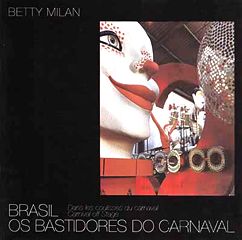
excerpt
“The people enjoy luxury; it’s intellectuals who enjoy poverty,” declared Joãosinho Trinta in 1979. What is the meaning of this statement by such a controversial Carnaval designer, responding to criticism that a poor country like ours cannot indulge in the luxury of samba school parades?
synopsis
A trilingual album in Portuguese, French, and English dedicated to Joãosinho Trinta and to the anonymous craftsmen of Carnaval. Illustrated with photos by Jorge Bodanski and Jorge Hirata, it focuses on the idea that Carnaval is not only the day of forgetting but also of our memory, and through it we Brazilians yearly recreate our identity. This hypothesis, developed in the introduction and the afterword, finds support in testimony from Carnaval followers interviewed by the author.
This work, a poetic documentation of the festival of Carnaval, focuses on the anthropophagic character of popular Brazilian culture, demonstrating the privileged place of the feminine figure in our Carnaval.
history
This book resulted from three years of research in the samba schools of Rio de Janeiro, where the author interviewed Carnaval enthusiasts, producing a pioneering work in Brazil and acquiring privileged access to Joãosinho Trinta. Issued in 1987 as a complimentary publication of the Eucatex company in São Paulo, the books had two editions in its commercial circulation: by the aOutra press in 1988 and by Empresa das Artes in 1994. It was translated into French and launched in pocket book format (Editions de l’Aube) at the Salon du Livre in Paris in 1998. Its definitive text was integrated into the reworked volume of articles Isso é o país, still unpublished in its printed form but accessible at this site under Selected Works of the author.
opinion
“A beautiful essay about the magic of Carnaval. It shows how the great dream is constructed.”
Jacob Klintowitz, Jornal da Tarde, February 13, 1988
areas of interest
Sociology, Anthropology, Brazilian Studies, because it reveals specifics of Brazilian culture.


